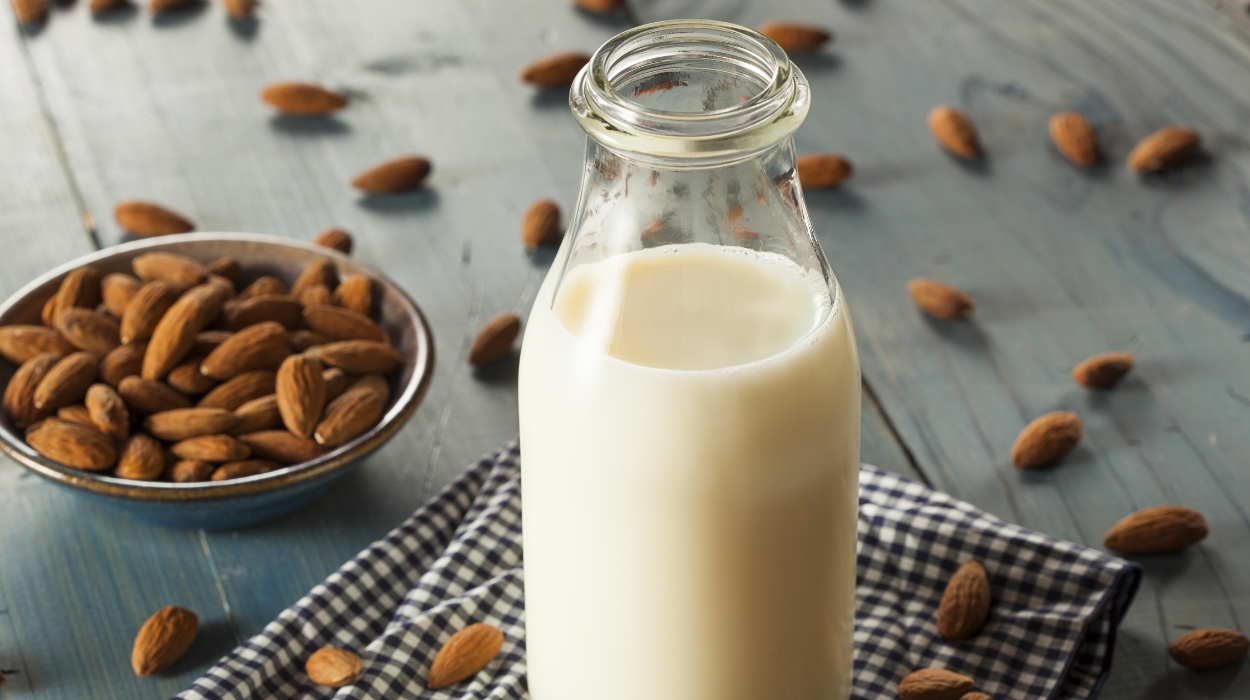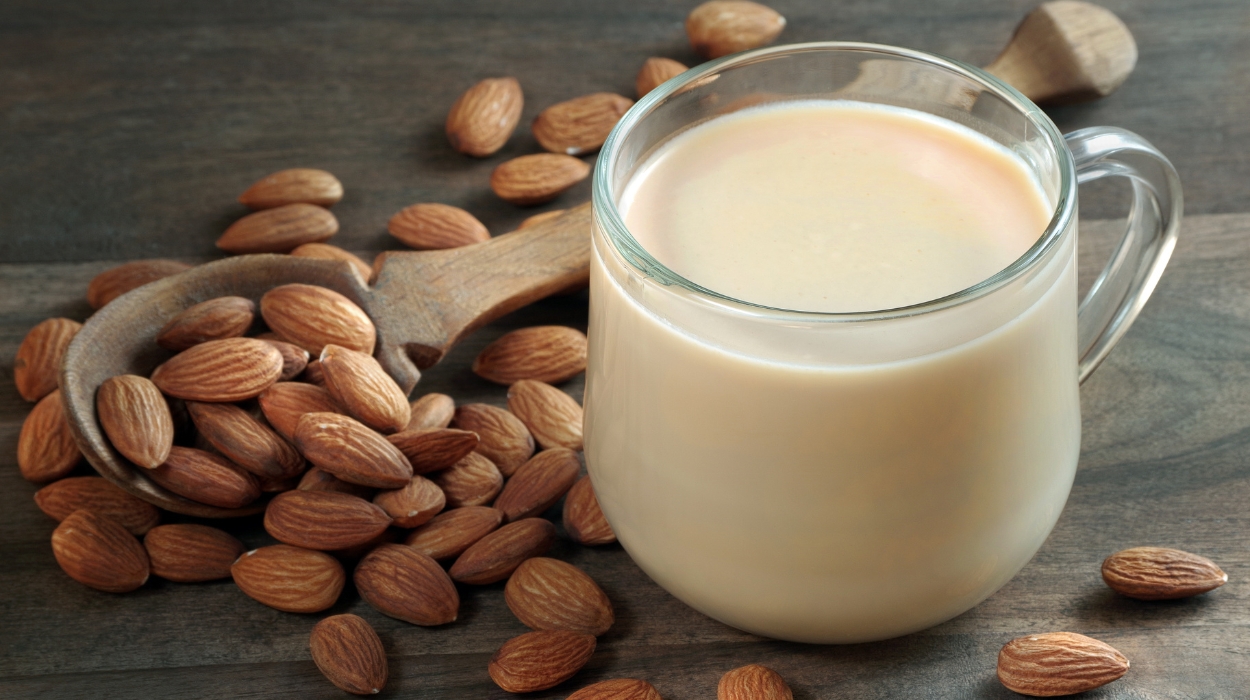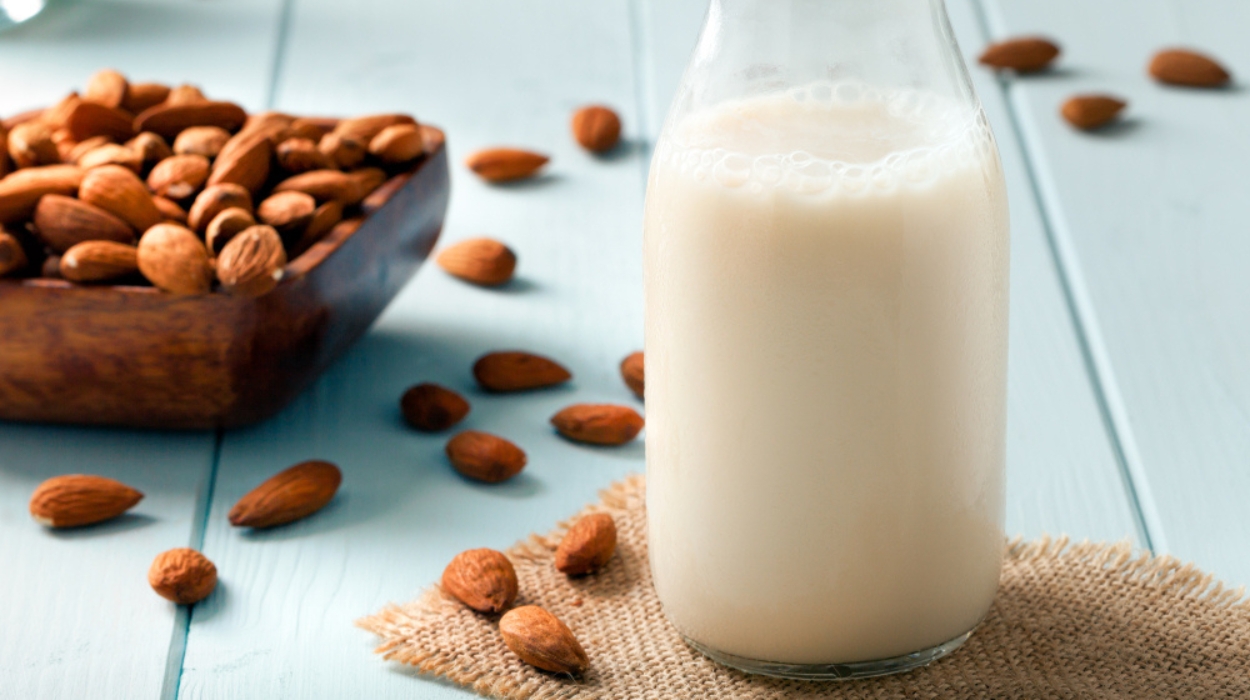When on a weight loss journey, it’s understandable that you wouldn’t want to sabotage your efforts by consuming the wrong foods. Whole cow’s milk may not be the best for weight loss — with almost eight grams of fat[1] per serving; some people are switching to plant-based milk like almond milk instead.
Is almond milk good for weight loss? Yes. Unsweetened almond milk is an excellent choice for weight loss because it’s low in fat and calories.[2] This makes it unlikely to contribute to weight gain, even if consumed in larger amounts.
Is Almond Milk Good For Weight Management?
Yes. Unsweetened almond milk is one of the best plant-based milk for weight loss. Almond milk is low in sugar, calories, and fat, which makes it ideal for weight loss.
Furthermore, whole almonds are high in protein and fiber.[3] Milking almonds reduces some of these nutrients, which may make almond milk less satiating. However, milking almonds does not add calories — this gives leeway to consume almond milk generously without worrying about weight gain.
Is Almond Milk Good For Weight Loss?

Yes.
Whole almonds have been demonstrated to assist in weight loss[4] – they help increase satiety,[5] and they do not increase[6] weight. Unfortunately, when almonds are milked, some weight-loss-supporting nutrients — especially fiber and protein[2] — are lost.
In this sense, weight loss benefits may be reduced because fiber and protein can help decrease appetite.[7]
Nevertheless, even without appetite-regulating effects, almond milk is low in calories. Unsweetened almond milk is also low in sugar. Being low in sugar[8] and calories makes it safe to drink it without incurring weight gain.
Almond Milk Nutrition Facts
Unsweetened almond milk is good for you, regardless of your weight loss goals. One serving[2] contains 2.5 grams of fat and less than 30 calories. There is no sugar in unsweetened almond milk. Yet, there are essential vitamins and minerals, including potassium, vitamin A, calcium, and vitamin D.
Commercially made almond milk may have slight variations in their nutritional value, depending on the brand. If you’re not getting enough nutrients through your diet, speak with your doctor — they may suggest taking supplements that can fill in nutritional gaps or help you lose weight.
Benefits Of Almond Milk

Lactose-Free
One of the benefits of almond milk is that it’s non-dairy. This means it’s lactose-free. Lactose is a carbohydrate naturally found in dairy foods; roughly 68% of the world’s population is lactose-intolerant.[9]
Even though skim milk is less fattening than whole milk, almond milk is a better choice from a lactose-intolerant perspective.
Low-Sugar
Drinking unsweetened almond milk means you’re not ingesting any excess sugar when you consume it. Added sugar means added calories, which can contribute to weight gain.[10] Furthermore, dietary sugar can contribute to metabolic disorders[11] and inflammatory diseases such as type 2 diabetes, multiple sclerosis, and inflammatory bowel disease.
Better Than Most Plant Milk
Almond milk could be a better option for weight loss than cow’s milk[1] because it has fewer carbohydrates and less fat. It has fewer carbohydrates, fat, and calories than other plant-based milk, such as coconut milk.[12] This makes it one of the best milks for weight loss.
How To Use Almond Milk For Weight Loss
You do not need to drink almond milk in certain amounts at certain intervals throughout the day to see the weight loss benefits. Simply enjoy unsweetened almond milk in any dish or drink you would normally use milk in.
Use Almond Milk In Oatmeal
Make your morning oatmeal with almond milk. Add cinnamon[13] and nuts[14] for extra weight loss benefits.
Make Hot Chocolate
Make homemade hot chocolate using unsweetened almond milk and dark chocolate. Dark chocolate has less sugar[15] and more antioxidants than milk chocolate.
Use Almond Milk In Smoothies
Throw fruit, vegetables, and nut butter in a blender along with almond milk to create a weight-loss-friendly smoothie.
Use Instead Of Coffee Creamer
Replace your coffee creamer with a splash of almond milk. This can offer a milk-like taste without the extra calories.
Drink Plain Almond Milk
Enjoy a glass of almond milk cold or warm without any added ingredients. When buying consumer almond milk, choose unsweetened brands to avoid excess sugar.
Make Nice-Cream
Create a vegan and weight-loss-friendly version of ice cream: nice-cream. Blend frozen banana with almond milk until it has a thick yet soft consistency. Serve cold, and enjoy!
Make Golden Milk
Golden milk is a mixture of milk and turmeric,[16] which is usually consumed warm. Swap out dairy milk for almond milk, cook with turmeric, and enjoy!
Cook With Almond Milk
Use almond milk in baking and cooking. Whether making bread, soups, pancakes, casseroles, mac and cheese, mashed potatoes, or muffins, almond milk can do the trick.
Add Almond Milk To A Healthy Lifestyle
Almond milk may be good for weight loss, but it is not a silver bullet. Add almond milk to an overall healthy diet and lifestyle. Be sure to exercise regularly and let your doctor know if you need additional support — for some individuals, diet pills or fat burners may be necessary.
Conclusion
Almond milk is an excellent alternative to dairy milk for anyone looking to lose weight or who is lactose-intolerant. Unsweetened almond milk is low in fat, sugar, and carbohydrates, making it suitable for any weight loss diet plan.
Some protein and fiber from almonds are lost during the milking process — this will reduce its satiating effect. Despite this, almond milk is unlikely to cause weight gain so it may be enjoyed freely on a weight-loss diet.
Still, drinking almond milk alone will not initiate weight loss. It should be consumed as part of a balanced diet and healthy lifestyle.
Frequently Asked Questions
Almond milk is better for weight loss than coconut milk because it is lower in fat, carbohydrates, calories, and sugar.
Almond milk is one of the best types of milk for weight loss. Dairy milk does contain more fat and protein, which may provide better satiety, but it also contains more fat and calories.
Yes. You can consume almond milk daily on a weight-loss diet.
No. Almond milk can not initiate weight or fat loss in any specific part of the body.
Yes. Almond milk is a plant-based, non-dairy milk, so it does not contain any lactose.
No. In the process of making almond milk, much of the protein and other nutrients are lost. This reduces its satiating effect, but it is still beneficial for weight loss.
It is unlikely that unsweetened almond milk would cause weight gain because it is low in calories, sugar, and fat. However, overconsuming any food could lead to weight gain, especially if it contains added sugar.
This will depend on your overall diet, lifestyle, and state of health. No research can conclusively say that all individuals will lose a certain amount of weight by incorporating almond milk into their diet.
 Evidence Based
Evidence Based
